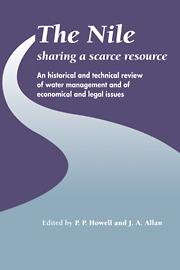 The Nile: Sharing a Scarce Resource
The Nile: Sharing a Scarce Resource Book contents
- Frontmatter
- Contents
- Preface
- List of Contributors
- Orthography
- Units and Conversion Factors
- Introduction
- I Environmental history of the Nile and its management
- II Nile management and factors affecting future management
- III Future utilisation of Nile waters
- IV Economic, international and legal issues
- 14 Evolving water demands and national development options
- 15 The Nile Basin: water management strategies
- 16 History of the Nile Basin and Lake Victoria basins through treaties
- 17 Principles and precedents in international law governing the sharing of Nile waters
- 18 Law and the River Nile: emerging international rules and the Sharia'h
- 19 Developing policies for harmonised Nile Waters development and management
- Index
17 - Principles and precedents in international law governing the sharing of Nile waters
Published online by Cambridge University Press: 05 February 2012
- Frontmatter
- Contents
- Preface
- List of Contributors
- Orthography
- Units and Conversion Factors
- Introduction
- I Environmental history of the Nile and its management
- II Nile management and factors affecting future management
- III Future utilisation of Nile waters
- IV Economic, international and legal issues
- 14 Evolving water demands and national development options
- 15 The Nile Basin: water management strategies
- 16 History of the Nile Basin and Lake Victoria basins through treaties
- 17 Principles and precedents in international law governing the sharing of Nile waters
- 18 Law and the River Nile: emerging international rules and the Sharia'h
- 19 Developing policies for harmonised Nile Waters development and management
- Index
Summary
Introduction
The provisions and principles of international law, governing the utilization of the waters of international rivers, developed relatively recently, since the problems involving international rivers were primarily those concerning international navigation. The 1815 Vienna Congress ushered in the principle of the freedom of navigation in international rivers, the first such instance being in relation to the Danube.
The more recent application of scientific methods to the utilization of the waters of international rivers, the new trend towards the construction of dams, reservoirs, canals and the like, have shown that the problem of the proper utilization of the waters of international rivers is no less important than the problem of navigation; hence the increasing need for the formulation of precise rules governing the new problem.
As an international river, the Nile is naturally governed by the rules of international law on the administration and the uses of the waters of international rivers. Until the middle of the nineteenth century, the prevalent principle governing the uses of the waters of international rivers, i.e the Harmon doctrine, inferred that the absolute sovereignty of a state over its territory permitted that state a free hand in the exercise of its sovereignty over that portion of the international river which passed through its territory, without due consideration to the possible damage which this freedom might cause to the interests of other riparians. This doctrine held sway over the first part of the nineteenth century.
- Type
- Chapter
- Information
- The Nile: Sharing a Scarce ResourceA Historical and Technical Review of Water Management and of Economical and Legal Issues, pp. 351 - 364Publisher: Cambridge University PressPrint publication year: 1994
- 1
- Cited by


